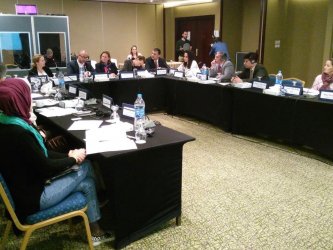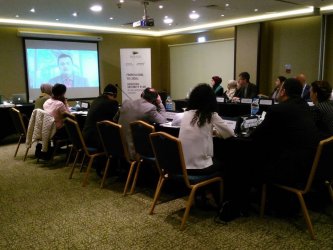-
From Global to Local: Debating Security Plus in the ...
From Global to Local: Debating Security Plus in the Jordanian Context
The West Asia-North Africa (WANA) Institute and Friends of Europe gathered 15 national experts and policy-makers on Thursday to discuss how to localise Preventing/Countering Violent Extremism (P/CVE) efforts. Participants debated on how to implement community-driven P/CVE projects and design counter-narratives that suit the Jordanian context.
Going Local on P/CVE: Challenges and Opportunities
Despite the importance of community-driven P/CVE projects, many stakeholders in Jordan face challenges securing financial support or obtaining the necessary security clearances.
Empowering teachers is vital to implement successful P/CVE projects on the local level, Ma’an Al Momani from the Ministry of Education said. “The Ministry of Education is working on various projects that contribute to countering violent extremism through the school curricula. We also train the teachers in cooperation with the Queen Rania Teacher Academy, so they can transfer their knowledge to the students.”
Dr Mohanned Arabiat, President of Generations for Peace, argued that we need to increase trust in local organisations: “We need to build trust between the local community and the public and private sectors. We need to empower local government workers and employees at community-based organisations. Investing in local leadership, especially youth leadership, is essential so that local communities can find their own solutions to the problems they face.”
“In addition to focussing on decentralisation, the central government should operate more transparently,” Mohammad Nasereddin from Mercy Corps noted. “If there is a lack of trust, local communities will be reluctant to cooperate.”
"We also shouldn't overlook the immediate challenges and the lack of services,” Shorouq Shatnawi from the Jordanian National Commission for Women, added. “If there is no bus for people from local communities to come to our workshop to talk about violent extremism, how can we expect them to participate?"
Patrick Daru from the ILO reminded the participants that “while the struggle against violent extremism is indeed fought on the local level, we simultaneously need strong national structures for improved social dialogue in the country.”
P/CVE Narratives: Design and Efficacy
A crucial aspect of P/CVE work is countering the ideology and narratives of violent extremist groups. “We need to move from designing mere counter-narratives that negate what violent extremist groups say, to designing positive alternative narratives that provide the audience with an alternative worldview,” Barik Mhadeen from the WANA Institute said.
In addition to narratives used in the media, the participants stressed the need to focus on narratives at the community level. “We need to focus on how the alternative relative is conveyed,” Leen Aghabi, international affairs researcher, mentioned. “Since mothers often detect early signs of radicalisation, we need to provide training to help them understand what good alternative narratives are. Female preachers, NGOs and civil society organisations have a big role to play here.”
To decrease youth’s vulnerability to radical narratives and ideology, Morad Al-Qadi from the Strong Cities Network noted that youth need to be given the space to develop their own identities independently: “Many Jordanian youth struggle with their religious and community identities as well as with defining their future aspirations, which makes them more vulnerable to radical ideology.”
Debating Security Plus: An Online Global Brainstorm
The event was organised to locally launch the report of Friends of Europe’s fifth global online security brainstorm ‘Debating Security Plus (DS+),’ which was held from 26 to 28 September 2017.
The online brainstorm was joined by over 1,700 participants from 122 countries, including government officials, leading figures from the EU, UN, NATO and OSCE, the military, academia, the media and industry representatives. It tackled security issues through 50 sessions and 48 hours of debating, and generated 10 top recommendations addressing practical policy goals.
The national experts on Thursday refined recommendations 6 (Think Small to Prevent and Counter Radicalisation Strategies) and 8 (Develop Proactive and Coordinated Responses to Countering Disinformation Campaigns) to suit the Jordanian context. The WANA Institute will publish a policy note based on the discussion next month.


